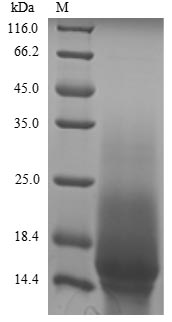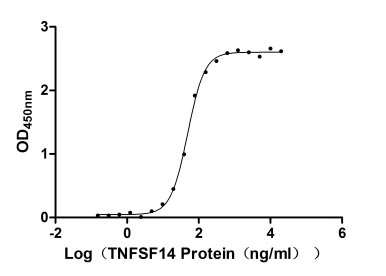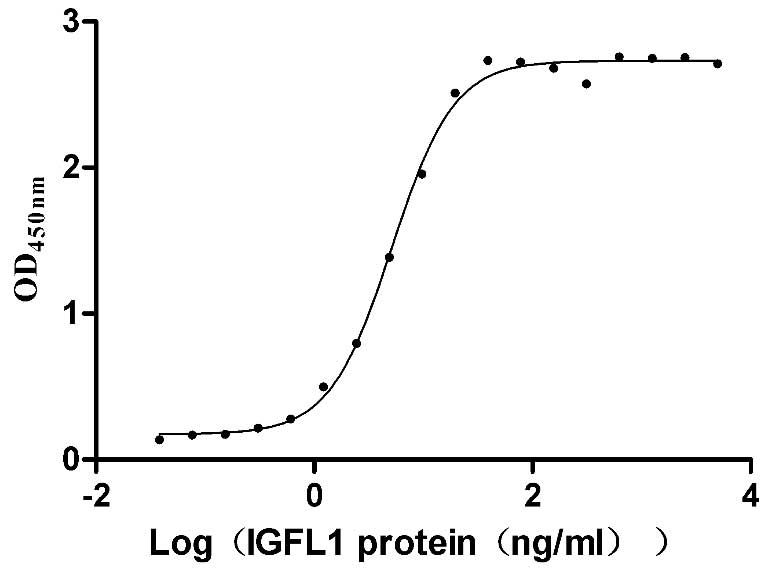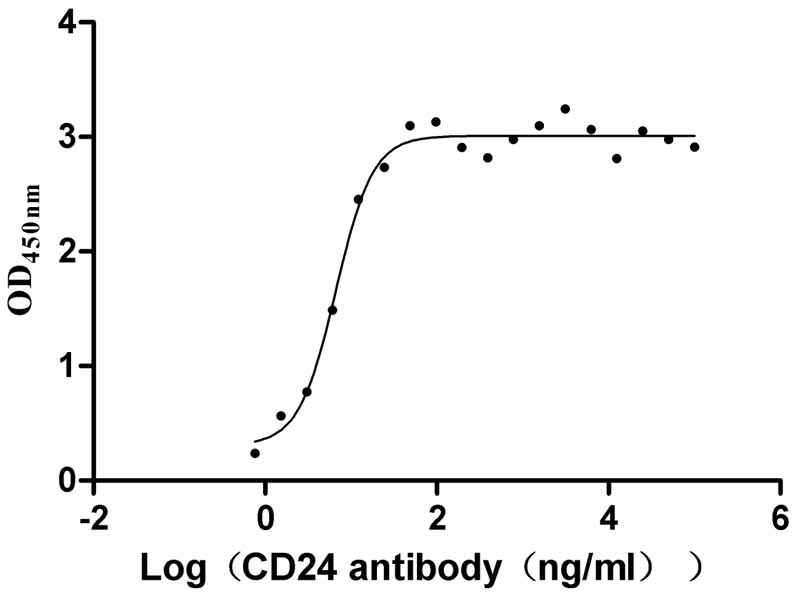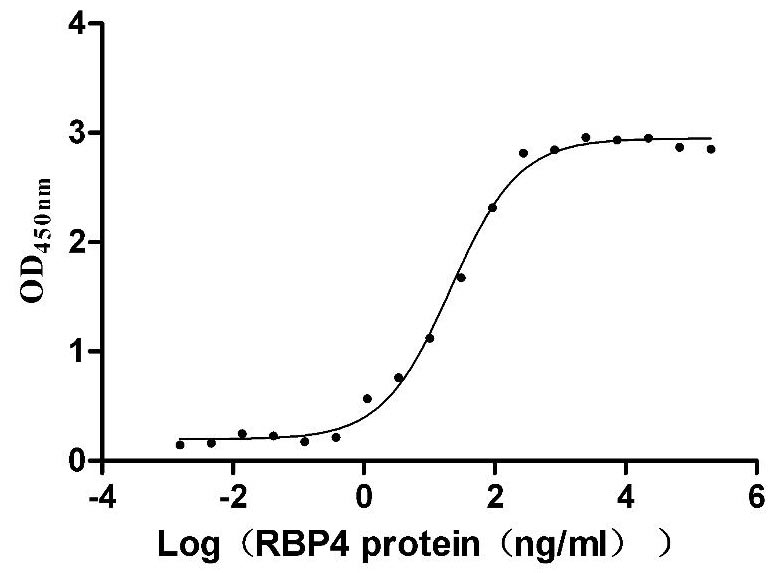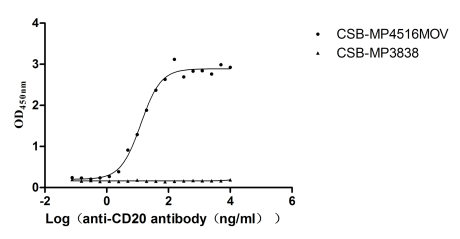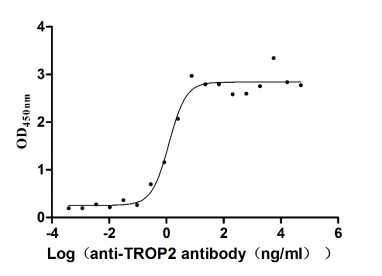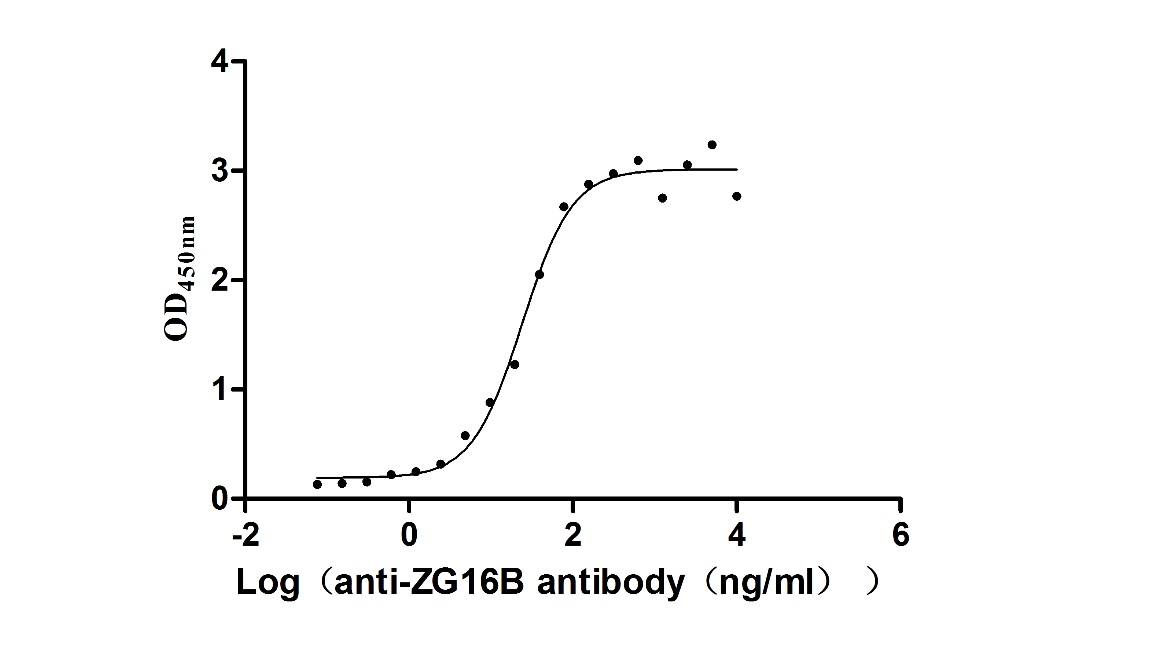Recombinant Mouse Aquaporin-4 (Aqp4), partial
-
中文名称:Recombinant Mouse Aquaporin-4(Aqp4),partial
-
货号:CSB-YP001964MO1f3
-
规格:¥1836
-
图片:
-
其他:
产品详情
-
纯度:Greater than 90% as determined by SDS-PAGE.
-
基因名:Aqp4
-
Uniprot No.:
-
别名:Aqp4Aquaporin-4; AQP-4; Mercurial-insensitive water channel; MIWC; WCH4
-
种属:Mus musculus (Mouse)
-
蛋白长度:Partial
-
来源:Yeast
-
分子量:10.9kDa
-
表达区域:253-323aa
-
氨基酸序列CPDVELKRRLKEAFSKAAQQTKGSYMEVEDNRSQVETEDLILKPGVVHVIDIDRGEEKKGKDSSGEVLSSV
Note: The complete sequence including tag sequence, target protein sequence and linker sequence could be provided upon request. -
蛋白标签:C-terminal Myc-tagged and C-terminal 6xHis-tagged
-
产品提供形式:Liquid or Lyophilized powder
Note: We will preferentially ship the format that we have in stock, however, if you have any special requirement for the format, please remark your requirement when placing the order, we will prepare according to your demand. -
缓冲液:Tris-based buffer,50% glycerol
-
储存条件:Store at -20°C/-80°C upon receipt, aliquoting is necessary for mutiple use. Avoid repeated freeze-thaw cycles.
-
保质期:The shelf life is related to many factors, storage state, buffer ingredients, storage temperature and the stability of the protein itself.
Generally, the shelf life of liquid form is 6 months at -20°C/-80°C. The shelf life of lyophilized form is 12 months at -20°C/-80°C. -
货期:Basically, we can dispatch the products out in 1-3 working days after receiving your orders. Delivery time may differ from different purchasing way or location, please kindly consult your local distributors for specific delivery time.Note: All of our proteins are default shipped with normal blue ice packs, if you request to ship with dry ice, please communicate with us in advance and extra fees will be charged.
-
注意事项:Repeated freezing and thawing is not recommended. Store working aliquots at 4°C for up to one week.
-
Datasheet & COA:Please contact us to get it.
相关产品
靶点详情
-
功能:Forms a water-specific channel. Plays an important role in brain water homeostasis and in glymphatic solute transport. Required for a normal rate of water exchange across the blood brain interface. Required for normal levels of cerebrospinal fluid influx into the brain cortex and parenchyma along paravascular spaces that surround penetrating arteries, and for normal drainage of interstitial fluid along paravenous drainage pathways. Thereby, it is required for normal clearance of solutes from the brain interstitial fluid, including soluble beta-amyloid peptides derived from APP. Plays a redundant role in urinary water homeostasis and urinary concentrating ability.
-
基因功能参考文献:
- The Aqp4 pool is drastically reduced in the skeletal muscle of mdx3cv mice, which have no dystrophin. PMID: 18284610
- Aquaporin 4 mislocalization away from astroglia and glia limitans delays the onset of brain edema PMID: 12232046
- AQP4 and alpha1-syntrophin colocalized frequently at the astrocyte membrane, especially at the perivascular astrocyte endfoot processes PMID: 12233788
- plays a critical role in inner ear fluid homeostasis and hearing PMID: 12359252
- role of accumulation in astroglial end-feet in dissipation of bidirectional water flow between blood and brain PMID: 12578959
- AQP-4 provides the principal route for water transport in astrocytes. PMID: 14576087
- water flux through perivascular AQP4 is needed to sustain efficient removal of K+ after neuronal activation PMID: 14597704
- AQP4 is expressed in brain endothelial cells & in the perivascular membranes of astrocyte endfeet. There are 3 distinct & serially coupled pools of AQP4 at the brain-blood interface. PMID: 14734638
- Sarcolemma vesicles from mdx mice show AQP4 loss from the plasma membrane & a big reduction in water permeability, implying a major role for aquaporins in skeletal muscle physiology & involvement of AQP4 in molecular changes in muscles of DMD patients. PMID: 15033928
- higher-order organization of AQP4 increases single-channel osmotic water permeability by one order of magnitude and that differential cellular expression levels of the two isoforms could regulate this organization. PMID: 15149973
- AQP4-mediated transcellular water movement is crucial for fluid clearance in vasogenic brain edema. PMID: 15208268
- a novel role for AQP4 as a regulator of brain extracellular space PMID: 15371505
- AQP4 deletion in mice is neuroprotective in a transient ischemia model of retinal injury, suggesting the possible use of AQP4 inhibitors in retinal vascular occlusive and ischemic diseases. PMID: 15557457
- AQP4-labeled astrocytic processes surround blood vessels, neuronal perikarya and processes, and both asymmetric and symmetric synapses: the protein may be involved in the regulation of water fluxes around both inhibitory and excitatory synapses. PMID: 15789430
- Data show that the sustained inhibition of gastric secretion due to tumours producing PYY/enteroglucagon in transgenic mice is associated with an increase in AQP4 expression and a down-regulation of H(+)/K(+)-ATPase in parietal cells. PMID: 15898955
- aquaporin-4 has species-specific roles in astrocytes and a functional relationship with Connexin43 PMID: 16103109
- Protective effect of AQP4 on brain swelling in bacterial abscess. AQP4 induction may reduce vasogenic edema associated with cerebral infection. PMID: 16181429
- Lead exposure induced a significant, 40%, increase in water permeability in astrocytes expressing AQP4, but had no effect on permeability in astrocytes not expressing AQP4. May contribute to acute lead intoxication. PMID: 16203098
- The lack of AQP4 expression is accompanied by sex- and region-specific alterations in brain amino acid and monoamine metabolism in mice. PMID: 16237719
- the involvement of aquaporin-4 in astroglial cell migration, which occurs during glial scar formation in brain injury, stroke, tumor and focal abscess. PMID: 16303850
- These results implicate AQP4 in the expression and termination of seizure activity and support the hypothesis that AQP4 is coupled to potassium homeostasis in vivo. PMID: 16470808
- These results suggest that AQP4, but not AQP1 or AQP9, may play an important role in water movement associated with the pathophysiology of edema after transient cerebral ischemia in the mouse. PMID: 16511868
- Modulation of AQP4 expression or function may be a novel therapeutic strategy for a variety of cerebral disorders including stroke, tumor, infection, hydrocephalus, epilepsy, and traumatic brain injury. PMID: 16564496
- A significant increase in the expression levels of AQP1 and AQP4 was found in mice at 270 dpi, the time corresponding with the appearance of PrP(res) immunoreactivity in Western blots and typical spongiform lesions in the brain. PMID: 16871401
- These findings provide direct evidences for the first time that aquaporin-4 plays an important role in the function of glutamate transporters. PMID: 17074507
- These findings reveal for the first time that AQP4 regulates not only water and ion homeostasis but also the functions of ovarian hormone and neurotransmitter. PMID: 17196551
- AQP4 showed a heterogeneous distribution in the central nervous system, but in some areas, an inverse correlation between AQP4 and extracellular matrix components has been observed, suggesting a complementary role for maintenance of water homeostasis PMID: 17349777
- This study demonstrates that AQP4 is important in the MPTP neurotoxic process and indicates that the therapeutic strategy targeted to astrocytic modulation with AQP4 may offer a great potential for the development of new treatment for PD. PMID: 17353068
- In conclusion, AQP4 mediates bidirectional transport of water across astrocytes during HI and reoxygenation. AQP4 manipulation may serve as a novel therapeutic strategy during different periods of hypoxic-ischemic brain edema in neonates. PMID: 17437301
- Evidence against functionally significant AQP4 modulation of Muller cell Kir4.1 potassium channel functionin retinal Muller cells. PMID: 17525153
- aquaporin-4 participates in the regulation of neurotransmitter release induced by depolarizing stimuli. PMID: 17611025
- A marked increase in AQP4 was observed in mice at the terminal stage of BSE, when they had a wide range of clinical signs, whereas no increase could be observed in the early stage before the onset of the clinical signs. PMID: 17868659
- This study report multiple lines of evidence against functionally significant AQP4-Kir4.1 interactions. PMID: 17869537
- Palmitoylated dystrobrevin restored alpha-syntrophin and aquaporin-4 (AQP4) to the mdx sarcolemma but was unable to recruit beta-dystroglycan or the sarcoglycans PMID: 18057022
- AQP4 is essential for the maintenance of blood-brain barrier integrity. PMID: 18281883
- Muller glial cells respond to excessive light with an alteration in the localization of aquaporin-4 protein; this alteration is thought to be a response to the edema in the outer retina and may support the resolution of edema. PMID: 18328627
- AQP4 deficiency alleviates proinflammatory cytokine release from astrocytes, in association with the SPHK1/MAPK/AKT pathway. PMID: 29956748
- Low expression of AQP4 is associated with Human immunodeficiency virus-associated nephropathy. PMID: 29608911
- This study demonstrated that the significant improvement in blood-brain barrier (BBB) permeability was observed in the AQP4-deficient ALS mouse model. PMID: 29154923
- Brain water content decreased following treatment with 3% HS relative to the TBI group. This was accompanied by decreases in AQP4, TNF-alpha, and IL-1beta mRNA and protein levels. PMID: 29600800
- Treatment with goreisan significantly decreased both brain water content and AQP4 expression in the ischemic brain at 24 hours after middle cerebral artery occlusion. PMID: 29153303
- The findings of this study demonstrated a novel molecular mechanism involving the SUR1-TRPM4-AQP4 complex to account for bulk water influx during astrocyte swelling. PMID: 28906027
- The findings of this study suggest that AQP4 KO leads to increased aggregation of Cx43 into gap junctions and provide a putative mechanistic basis for the enhanced tracer coupling in hippocampi of AQP4 KO mice. PMID: 28551776
- Interaction of the IgG-AQP4 complex with FcgammaRs triggers coendocytosis of the excitatory amino acid transporter 2. PMID: 28461494
- The diffusive and AQP4-independent solute transport in rodent brain parenchyma has been demonstrated. PMID: 28826498
- Present study demonstrated that AQP4 depolarization is a widespread pathological condition and may contribute to motor neuron degeneration in ALS. PMID: 28627708
- Dataindicate that astrocytes in the substantia nigra differ from those in neocortex by showing a higher level of aquaporin-4, particularly in those endfoot membrane domains that mediate water exchange between brain and blood. PMID: 28735099
- AQP4-specific T cells contribute to AQP4-targeted CNS autoimmunity PMID: 27940915
- AQP-4 expression was significantly elevated in the ipsilateral hemisphere in the first 24h following cerebral cortical injury in mice and this could be correlated with worsening of neurological function. Over the next 48h, there was a trend towards decrease in AQP-4 expression that was associated with partial recovery of neurological function. PMID: 28645746
- Study shows that the size of the aquaporin-4 (Aqp4) pool differs considerably between brain regions, roughly mirroring regional differences in Aqp4 mRNA copy numbers. PMID: 27629271
显示更多
收起更多
-
亚细胞定位:Cell membrane; Multi-pass membrane protein. Basolateral cell membrane; Multi-pass membrane protein. Endosome membrane. Cell membrane, sarcolemma; Multi-pass membrane protein. Cell projection.
-
蛋白家族:MIP/aquaporin (TC 1.A.8) family
-
组织特异性:Detected in brain cortex, especially around cortical blood vessels, and subjacent to pia, with lower levels in parenchymal membranes. Detected in ependymal and astroglial cells in brain. Detected in supporting Hensen's cells, inner sulcus cells and Claudi
-
数据库链接:
KEGG: mmu:11829
STRING: 10090.ENSMUSP00000078088
UniGene: Mm.250786
Most popular with customers
-
Recombinant Human Tumor necrosis factor ligand superfamily member 14 (TNFSF14), partial (Active)
Express system: Mammalian cell
Species: Homo sapiens (Human)
-
Recombinant Human IGF-like family receptor 1 (IGFLR1), partial (Active)
Express system: Mammalian cell
Species: Homo sapiens (Human)
-
Recombinant Human Signal transducer CD24 (CD24)-Nanoparticle (Active)
Express system: Mammalian cell
Species: Homo sapiens (Human)
-
Recombinant Mouse Transthyretin (Ttr) (Active)
Express system: Mammalian cell
Species: Mus musculus (Mouse)
-
Recombinant Human Zymogen granule protein 16 homolog B (ZG16B) (Active)
Express system: Mammalian cell
Species: Homo sapiens (Human)
-
Recombinant Macaca fascicularis Membrane spanning 4-domains A1 (MS4A1)-VLPs (Active)
Express system: Mammalian cell
Species: Macaca fascicularis (Crab-eating macaque) (Cynomolgus monkey)
-
Recombinant Human Tumor-associated calcium signal transducer 2 (TACSTD2), partial (Active)
Express system: Mammalian cell
Species: Homo sapiens (Human)
-
Recombinant Macaca fascicularis zymogen granule protein 16 homolog B (ZG16B) (Active)
Express system: Mammalian cell
Species: Macaca fascicularis (Crab-eating macaque) (Cynomolgus monkey)

